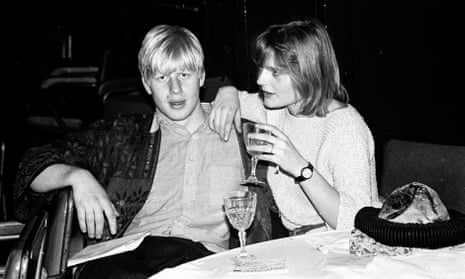1. Blond ambition
Alexander Boris de Pfeffel Johnson was born on 19 June 1964 in New York and is still known by his family as Al. Over the next 14 years he moved house 32 times across two continents as his father Stanley pursued a wide-ranging career. Only 22 when she had him, his mother Charlotte had given up her English degree at Oxford to accompany her husband to the US. Until the age of eight Boris was severely deaf with glue ear and was a subdued child. His mother encouraged him to be arty but Stanley inculcated an uber-competitive streak in his family.
Winning was the priority, whether running fastest, jumping highest or having the blondest hair, leading the young Al to set his sights on becoming “world king”. Unable to cope with with the constant moves and Stanley’s womanising, Charlotte suffered a severe breakdown when the family went to Brussels. Her absence in hospital led to the Johnson brood having to learn how to fend for themselves.
2. Al becomes Boris
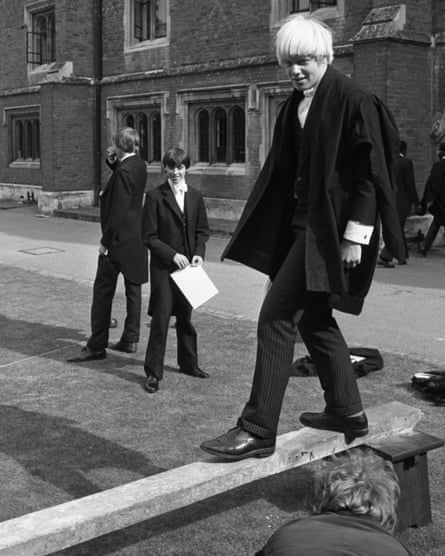
Al and Rachel – the two eldest – were sent away to prep school in England. Family friends recall that Al now came under fire for his Turkish lineage and the fact that he lived in Brussels. As self-protection he started to hone an English eccentric persona, a seemingly bumbling figure in tatty clothes concealing a finely tuned mind bent on survival. By the time he went on to Eton, this public version of Al was growing more flamboyant – a transformation he enforced by changing to the more distinctive name of Boris. As his schoolwork suffered, he impressed but also infuriated his teachers with his “disgracefully cavalier attitude”.
3. Oxford chameleon
Johnson went to Oxford in 1983 having, despite his teachers’ misgivings, won a scholarship to study classics at Balliol. It seemed that all the glittering prizes would fall into his lap, including membership of the Bullingdon Club, an upper-class drinking society renowned for its casual vandalism of other people’s rooms, property and feelings. One trophy that eluded him at his first attempt was the presidency of the Oxford Union. He barely bothered to canvass beyond public school alumni and was defeated by a slick Liberal grammar school boy. Failure struck Johnson almost as a bereavement, but he learned from it. Boris Mark II rinsed out the shades of Tory blue to appear more politically androgynous and he disguised his sense of entitlement with lashings of humour. He also recruited a band of starstruck helpers to do the hard graft for him and this time he won. It was now that he discovered that success with women was one of the perks of power. Boris the chameleon politician – and Boris the seducer – had been born.
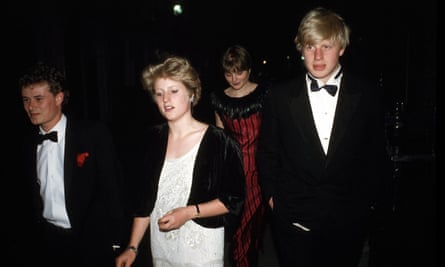
4. World on speed dial
As soon as he graduated with a 2:1 in 1987 Johnson married the beautiful and wealthy Allegra Mostyn-Owen at a wedding celebrated with a specially commissioned violin duet. Soon he landed a plum job in journalism, assisted by formidable family connections,including his godmother, the writer Rachel Billington (daughter of Lord Longford and sister of Lady Antonia Fraser). He was taken on as a graduate trainee at the Times, but the shambolic Boris persona did not impress his news editors. The star of Eton and Oxford was given low-grade work and, desperate for glory, made up a quote to sex up a story and attributed it to his godfather, the academic Colin Lucas. Lucas complained to editor Charlie Wilson, who sacked the young trainee.
5. The Brussels years
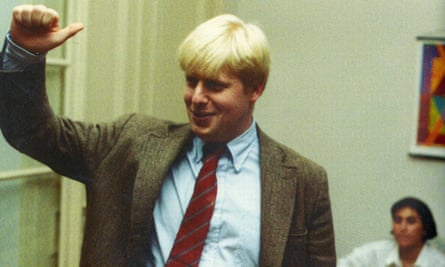
Johnson was swiftly scooped up by Max Hastings, then editor of the Daily Telegraph, whom he had invited to speak at the Oxford Union during his presidency. Hastings was a more accommodating employer and in 1989 promoted his protege to become Brussels correspondent when he was just 25. Over the next five years Johnson made his name by almost singlehandedly developing a compelling narrative that everything emanating from the EU was either loony or sinister. Towards the end of his time in Brussels his distorted stories had damaged his credibility among his peers in Europe but back home he was becoming a household name. It was his first taste of power and he revelled in it.
6. The TV personality

Johnson was brought back to London in 1994 and elevated to the Telegraph’s assistant editor and chief political columnist – although he privately confessed to a colleague to not possessing “any political opinions”. He also acquired a column in the Spectator, which he littered with such terms as “piccaninny” and “puffing coolies”. The chilling tape of his conversation with his friend Darius Guppy, a convicted fraudster, in which he agreed to help Guppy with his plan to beat up a journalist, also came to light. But it was fashionable at the time to rail against so-called political correctness and to some Johnson seemed like a breath of fresh air.
When he was invited on Have I Got News for You in 1998, the Guppy tape was raised again but Johnson made the audience laugh with him by rolling his eyes and ruffling his hair and won a vast new following. What should have sunk him had made him untouchable.
7. The Sextator

Johnson was now intent on cashing in on his fame and launching his political career, but in 1999, just after his 35th birthday, he was made editor of the Spectator on the explicit understanding he would drop his parliamentary ambitions. Within two years, however, he had become MP for the plum Tory seat of Henley, promising its residents that he would step down from the Spectator – but he stayed on for four years.
It was not just his employers and voters whom he thus betrayed but also his second wife Marina, whom he had married while still in Brussels. During his six years as editor the magazine, now dubbed the Sextator, became a byword for lasciviousness. One of Johnson’s longest liaisons at this time was with his columnist Petronella Wyatt, but he lied about the affair to Tory leader Michael Howard’s communications chief Guy Black. When sacked for dishonesty, he insisted that it was acceptable, even desirable, to lie.
8. Mr Mayor
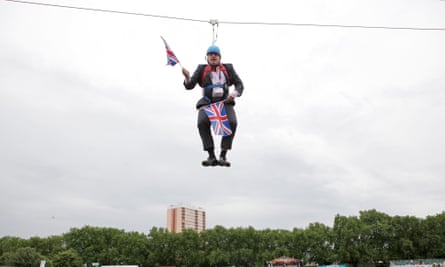
Johnson’s first stint as an MP was hardly a storming success, and reports of more affairs did not help. Insult was added to injury when David Cameron, a fellow Etonian two years his junior, became Tory leader. When he omitted to raise Johnson to his shadow cabinet, Johnson’s chances of advancement seemed vanishingly thin. No wonder that when the Tory candidacy for the London mayoralty was offered to him, he was interested. A disciplined campaign catapulted Johnson into City Hall in 2008. The shine wore off almost instantly, however, when it became clear he had virtually no plans. Many appointments made in indecent haste ended in sackings, resignations, accusations of lying and racism and even a criminal conviction. And yet he won again in 2012, going global at the Olympics by allowing himself to get stuck in front of the world’s cameras on a zipwire.
9. Leave
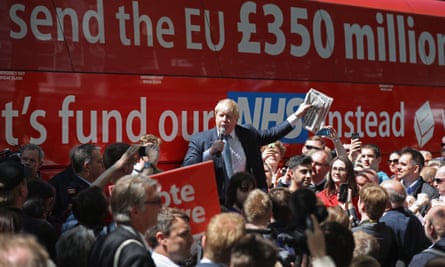
Red Boris – pro-cycling, pro-Europe, pro-immigration, anti-Trump – had won London but by the end of his second term the old, bluer version of Boris was back. Pandering to the new rightward swing of the Conservative party, Johnson positioned himself to attack by standing for parliament again a year before he was due to leave City Hall. In 2016 he famously wrote two columns setting out an argument for both sides of the EU referendum. But clearly his best chance of removing his Remain rival Cameron from Downing Street was by backing Leave, and he did so with his characteristic campaigning flair and disdain for facts and rules. After his side won, it looked as if he would become PM. But when fellow Leave campaigner Michael Gove declared him unfit to lead the country through Brexit – and even questioned his true commitment to leaving the EU – Johnson’s hopes were quashed and Theresa May came to power instead.
10. Final lap
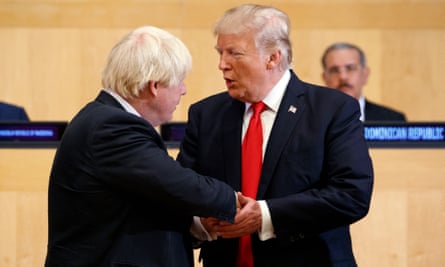
To general astonishment – including probably his own – May made Johnson her foreign secretary despite obvious antipathy between them. Frustration at his failure to read briefs, however, turned to fury over his gratuitous causing of offence to foreigners. Perhaps his greatest crime was his careless words that directly led to the extension of the prison sentence in Iran of the young British-Iranian woman Nazanin Zhagari-Ratcliffe. Regarded as one of the worst foreign secretaries in history, he resigned in 2018 in protest at May’s deal with the EU, describing it as a “turd” (although he later went on to vote for it.) Such details, however, passed by President Trump, who has repeatedly hailed Johnson as the best person to become Britain’s next prime minister. If he does take possession of No 10, as expected, we will soon find out how much more the two men have in common than extraordinary hair.
Sonia Purnell is the author of Just Boris: A Tale of Blond Ambition
